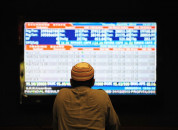In tariff U-turn, US softens tone
'Trump card' fading after weeks of tough posturing when levies went above 145%

In a potential U-turn to significantly scale down reciprocal 145% tariffs on most Chinese goods, US President Donald Trump's shift in tone has broken the ice and soothed markets. It comes in the backdrop of a vast array of reasons including the intervention of top executives of US stores and companies following shortage of products, substantial pressure from US states, allies and international institutions and above all, a unified political system and resilient social norms in China.
The US president's floating "Trump card" is "fading", pointing to a potential U-turn on the issue of staggering reciprocal tariffs on China. It appears to mark a "rhetorical" climb-down after weeks of tough posturing and tit-for-tat retaliation that sent tariffs beyond 145%.
It "sparked" new fuel for sinking stocks, money and commodity markets and financial partnerships around the globe, creating hope for global economic stability and financial sustainability.
The recent arbitrary imposition of US tariffs has seriously "infringed" upon the legitimate rights and interests of other countries and severely undermined the rule-based multilateral governance system.
A widening gap in important policy measures among the ranks of Trump cabinet and serious concern shown by corporate supporters, economic advisers and strategists have forced him to blink first for a reduction in tariffs and engaging in negotiations.
Moreover, increasing risks of recession, high inflation, decline in foreign direct investment, slowdown of revenues, shortage of essential food items and increase in unemployment and poverty have dealt a blow to the Trump administration.
On the other hand, the Chinese leadership has come up with a very tame reaction, showing utmost political resolve, economic resilience, social unity and diplomatic wisdom. Chinese have a more unified, hardened and disciplined political system and resilient social norms than the US administration to withstand a trade war.
Definitely, they own a true and people-friendly governance system which is grass-rooted, consultative, productive and participatory. Its private sector has a firm belief in the socialist economy, community development, balanced social development (rural and urban), innovative digitalisation, AI and modernisation, giving it a considerable comparative advantage to mitigate socio-economic, geopolitical and geostrategic shocks and internal adjustments.
Undoubtedly, it has a highly developed and remarkably agile supply chain, which consists of a comprehensive modern industrial framework, encompasses 41 industrial categories and 666 subcategories, making it the only nation globally to cover all industrial sectors and positioning it as the "Factory of the World".
China has a modern industrial sector with the necessary infrastructure such as 5G and cloud services. Factories in China have surpassed those in many developed nations in terms of automation.
According to The Economist, Trump calmed markets further by saying he plans to be "very nice" to China in trade talks, suggesting that he could substantially reduce tariffs. US Treasury Secretary Scott Bessent has said the trade stand-off with China is unsustainable, but that tariff reductions would not be unilateral.
In one telling indication of how Trump's policies have upended established trade, DHL, a global logistics company, suspended business-to-consumer shipments to the United States worth more than $800. The company blamed more stringent customs checks in America. Business-to-business deliveries have not been affected.
International trade expert Dr Aadil Nakhoda said a major issue that Trump faces is that Chinese goods, due to the massive economies of scale in production, are one of the cheapest in the world and the reliance of American consumers on them is due to the ability to satisfy their needs in terms of price and quality. Hence, restricting and limiting their imports hurts American consumers. Therefore, the tone changes as negotiations are failing.
With the appellate body of the World Trade Organisation (WTO) almost dysfunctional, China has taken advantage of the situation by providing massive subsidies to its producers to offset the loss of US markets.
Currently, China is playing a wait-and-see game. American consumers are likely to feel the pinch before Chinese producers, who can be offered alternative markets and subsidies by their government.
"We have seen this with EVs and solar panel production. Eventually, both will come to negotiate due to strong linkages and dependency between the two parties," Nakhoda said.
Now, the US wants China to reduce tariffs. This is again an attempt to call each other "bluff". The additional tariffs are not a long-term solution but are used as a ploy by Trump to renegotiate trade terms. Efforts are being made to set the negotiating table.
Centre for South Asia and International Studies Islamabad Executive Director Dr Mehmoodul Hassan Khan said it is crystal clear that the Chinese ancient wisdom of dialogue, deterrence, development, determination and self-reliance will not be swayed and over-shadowed by the skyrocketing US tariffs. Even Trump's most recent indication of reduction in tariffs and holding negotiations on its own terms and conditions will not force the Chinese government to accept it.
Unfortunately, it seems that the US administration does not know even the basics of the Chinese wisdom, socialist economic characteristics, political culture, diplomatic art and statehood qualities.
On the other hand, the Chinese government always speaks about constructive competition, international cooperation, economic globalisation, openness, modernisation, fair, free and just global governance and a rule-based world order through shared prosperity and Xi's global initiatives pertaining to development, security and civilisation.
Reuters reported that 12 states, including New York, Arizona and Illinois, filed a suit against the Trump administration on Wednesday last week in the US Court of International Trade, claiming that tariffs established through the International Emergency Economic Powers Act are illegal. The states joined California, which filed a separate suit, in challenging the tariffs. Simultaneously, the International Monetary Fund was quoted as saying the tariffs will slow growth and push debt higher across the globe.
With free falling markets and reportedly an Oval Office intervention by the CEOs of Walmart, Target and Home Depot, the US president is going to water down its tariff policy, including the 145% levy on China.
Warnings of empty store shelves have been in the headlines as multiple press reports indicate that the CEOs of America's top retail stores told President Trump that a prolonged trade war would lead to shortages.
It is suggested that since the trade war has vaporised trillions of dollars from the stock market, caused the dollar to plunge and tipped America's economy closer to recession, both sides should immediately start meaningful negotiations.
The writer is a staff correspondent



















COMMENTS
Comments are moderated and generally will be posted if they are on-topic and not abusive.
For more information, please see our Comments FAQ